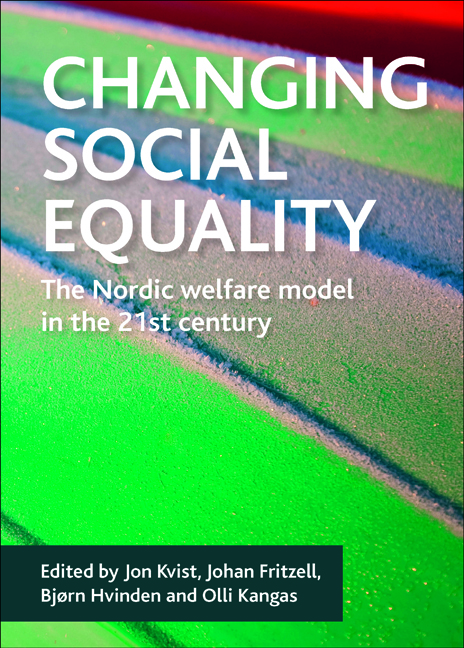Book contents
- Frontmatter
- Contents
- List of tables and figures
- Notes on contributors
- Acknowledgements
- one Changing social inequality and the Nordic welfare model
- two Anti-immigration attitudes, support for redistribution and party choice in Europe
- three Do we all (dis)like the same welfare state? Configurations of public support for the welfare state in comparative perspective
- four Eroding minimum income protection in the Nordic countries? Reassessing the Nordic model of social assistance
- five Equality in the social service state: Nordic childcare models in comparative perspective
- six Welfare state institutions, unemployment and poverty: comparative analysis of unemployment benefits and labour market participation in 15 European Union countries
- seven Social inequalities in health: the Nordic welfare state in a comparative context
- eight Income inequality and poverty: do the Nordic countries still constitute a family of their own?
- nine Is immigration challenging the economic sustainability of the Nordic welfare model?
- ten Nordic responses to rising inequalities: still pursuing a distinct path or joining the rest?
- Index
ten - Nordic responses to rising inequalities: still pursuing a distinct path or joining the rest?
Published online by Cambridge University Press: 01 September 2022
- Frontmatter
- Contents
- List of tables and figures
- Notes on contributors
- Acknowledgements
- one Changing social inequality and the Nordic welfare model
- two Anti-immigration attitudes, support for redistribution and party choice in Europe
- three Do we all (dis)like the same welfare state? Configurations of public support for the welfare state in comparative perspective
- four Eroding minimum income protection in the Nordic countries? Reassessing the Nordic model of social assistance
- five Equality in the social service state: Nordic childcare models in comparative perspective
- six Welfare state institutions, unemployment and poverty: comparative analysis of unemployment benefits and labour market participation in 15 European Union countries
- seven Social inequalities in health: the Nordic welfare state in a comparative context
- eight Income inequality and poverty: do the Nordic countries still constitute a family of their own?
- nine Is immigration challenging the economic sustainability of the Nordic welfare model?
- ten Nordic responses to rising inequalities: still pursuing a distinct path or joining the rest?
- Index
Summary
In the introductory chapter to this volume (Chapter One) we identified a number of key issues related to current changes in social inequality in the Nordic countries. In these concluding remarks we first summarise the main factors contributing to the changes, based on the analyses presented in the individual chapters. Second, we discuss whether the Nordic welfare states have been able to prevent or mitigate increasing inequalities. Finally, we seek to give some answers to the critical question raised in the introductory chapter: are the Nordic countries managing to stem the international tide of inequality better, worse or perhaps just differently than other countries?
Consequences of immigration and ethnic diversity
Several chapters give considerable attention to the role of immigration, especially from outside the richer part of the world, as a new challenge for the Nordic welfare states and as a potential source of increased inequalities. Henning Finseraas (Chapter Two) takes issue with the growing international literature claiming that immigration-driven ethnic diversity is diminishing the electoral support for redistributive public provisions and, through reduced backing of parties favouring redistribution, creating greater social inequalities. While he refutes the simple hypothesis that immigration-driven ethnic diversity in itself decreases support for redistribution, he finds that comparatively low employment rates among immigrants tend to weaken support for the main parties in favour of redistribution.
Comparatively low employment rates among immigrants are also an important factor when in Chapter Eight, Johan Fritzell, Olof Bäckman and Veli-Matti Ritakallio find that immigrants from outside the European Union (EU) are one of the major groups at risk of poverty, in both the Nordic and other European countries. To the extent that newly arrived immigrants without work are particularly dependent on means-tested minimum income benefits, the situation appears no better, as Susan Kuivalainen and Kenneth Nelson (Chapter Four) show that such benefits in most countries provide decreasing protection against poverty.
In Chapter Five Gabrielle Meagher and Marta Szebehely emphasise how the home childcare allowance (HCA) provided by several Nordic countries may reinforce traditional gendered divisions of labour, under-use of childcare services and low female employment among immigrants from non-Western countries.
- Type
- Chapter
- Information
- Changing Social EqualityThe Nordic Welfare Model in the 21st Century, pp. 201 - 206Publisher: Bristol University PressPrint publication year: 2011



